False Bay garden in February twentyTutu
by Diana Studer
- gardening for biodiversity
in Cape Town, South Africa
We always have some flowers and colour. Only one hibiscus flower - but that one is a bunch. Vivid orange Tecomaria against a deep blue sky. Yellow daisies, low shrubby Euryops and climbing Senecio. Bauhinia has one white flower so high up. Garlic buchu with lots of feathery flowers.
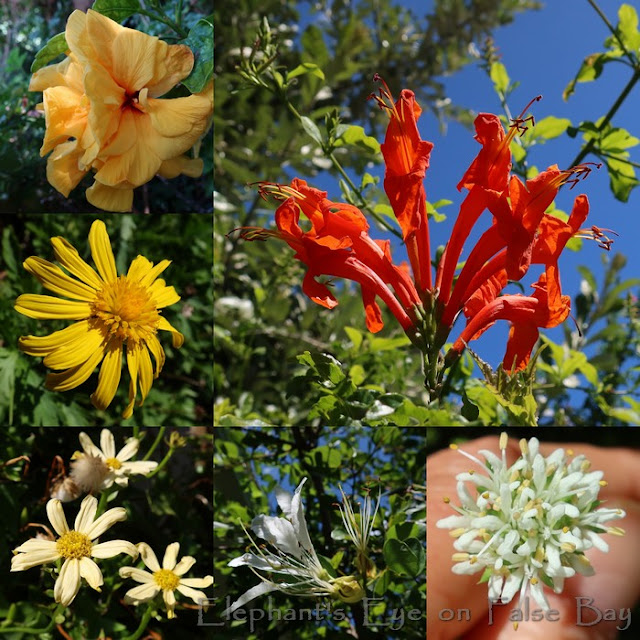 |
| February garden flowers |
I started on the hedge. The short side. Metalasia muricata, which volunteered, is covered in flowers.
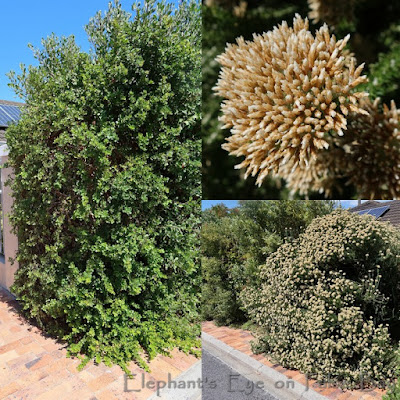 |
| Searsia crenata and Metalasia muricata |
Iceberg is happy in flowers. For Through the Garden Gate. With Sarah in Dorset.
 |
| Iceberg rose |
Took a lot off the Brachylaena, but even standing right back in the corner I can't get it all in one picture. More to prune. We found me a garden kneeler / seat - which I need when I battle the dwarf papyrus which eats too much of Froggy Pond.
 |
| Brachylaena and Froggy Pond |
Pink pelargoniums. Above is capitatum with soft velvety leaves. Below I think graveolens with a more herbal smell.
 |
| Pink pelargoniums |
Since Diospyros whyteana has flowers, I can see why it is called bladdernut. Altho it is more squishy Chinese lantern than a hard walnut shell.
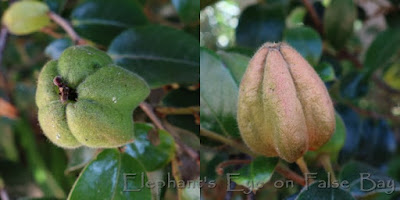 |
| Bladdernut Diospyros whyteana |
Streptocarpus in the pot is delighted to have more room and fresh compost. Those I planted out are finding life in the ground harder.
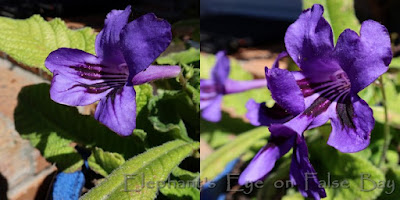 |
| Streptocarpus |
Edible banana is come 'ere and gimme a hug, the little one is coming up fast.
 |
| Banana |
I went to investigate why I see bees at the bird feeder. After the doves and sparrows have eaten most of the seed, the bees buzz their wings furiously to clear the chaff and leftover seeds which drift down. Then they carefully collect the flour and pack it on their saddlebags. We have made sure the bag of seed we choose has 'flour for the bees'.
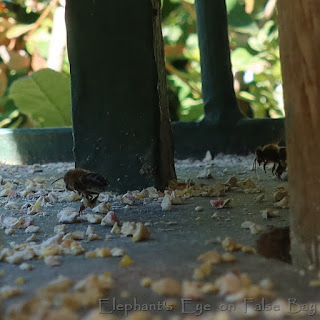 |
| Bees collecting flour from bird feeder |
Meanwhile the garden turns to autumn blues. Mauve Plectranthus, soft blue sky Plumbago and pure azure Anchusa capensis.
 |
| Turning to autumn blues |
I invite you to join us at Elephant's Eye on False Bay. Please subscribe as you prefer
via Feedly,
or my Facebook blog page
Pictures by Diana Studer
of Elephant's Eye on False Bay
Teal blue text is my links.
To read comments if you are in a Reader,
first click thru to the blog)
Thanks for comments that add value. Your comment will not appear until I've read it. No Google account? Use Anonymous, then please include a link to your own blog. I welcome comments on posts from the last 2 months.
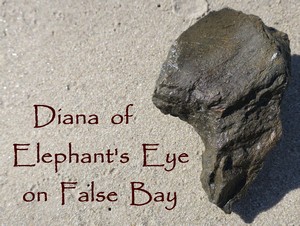
Your garden is always beautiful. I am so happy that spring flowers are here. Our magnolia trees are beautiful this time of year. xo Laura
ReplyDeleteHow interesting that the bees seek out the "flour" among the seed debris. I'm going to need to pay closer attention to see if I can catch our bees doing anything of that nature. As usual, your garden looks splendid. Best wishes with the pruning.
ReplyDeleteAmazing to see the bees on the bird table! On a cold wet evening here it is lovely to see your bright colourful flowers against such a bright blue sky! Sarah x
ReplyDeleteBeautiful blooms and plants and pollinators! This must be a pleasant time of year in your locale. The iceberg rose is really special.
ReplyDeleteOh that peek into your colourful garden has brightened the start of my day. That first picture with the hibiscus and daisies is so vivid. B x
ReplyDeleteIt's always a treat to see what's happening in your garden, but especially so at this time of year when I'm getting impatient for the snow to be gone and for the gardening season to begin. I love your blues. I bought myself one of those kneeler/seat combinations several years ago and have never regretted it.
ReplyDeleteYour garden is always full of flowers. Reading your post I'm wondering if you sometimes miss a real winter?
ReplyDeleteThat's really interesting about the bees. What is the 'flour' made of though? Love all your garden flowers, as always. Plumbago is one of my favourite flowers.
ReplyDeleteThe dusty residue from the bird seed, bit of chaff, bit of flour.
Delete